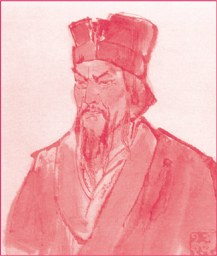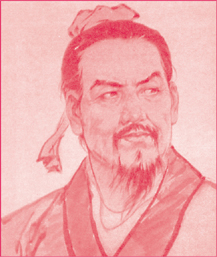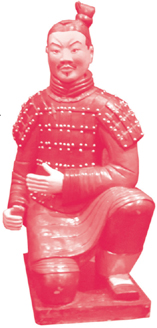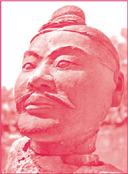To follow the next step in our journey through Chinese philosophy, we need to look in a little more detail at the history of the Warring States.
If we were to study a map of China in 450 BCE, we would find the state of Qin located at the far western end of the area of Chinese culture. At the time, it was even felt by some of the other states forming the remains of the Zhou Dynasty that the people of Qin were not really Chinese at all. The people of the so-called ‘Six Kingdoms’ all followed Zhou culture, but the people of Qin, with their war-like attributes, including the use of horses in battle, were viewed as more like the external ‘barbarians’. The feeling of ‘inside’ and ‘outside’ was emphasised by the evolution of long defensive walls not only between the states, but also as an outer bulwark against the nomadic tribes who inhabited the lands to the north and west.
As the Warring States period began, with increasing military activity facilitated by emerging iron-founding technology, the remains of the Zhou hegemony began to crumble when the state of Jin started to collapse in about 403 BCE. By 376 BCE it had split into the three distinct states of Zhao, Wei and Han.
While the Warring States’ rulers were struggling to maintain coherent administration in the face of increasing confusion in society, a new strand of thought was emerging. One key factor of traditional rule was the need to observe the Rites in maintaining a hierarchical structure in which all, from highest to lowest, were linked with ties of duties and obligations. This was always an idealistic concept, and, as society became more complex and the areas controlled by a state grew larger, the top and the bottom of the sociological pyramid became more and more estranged from each other. One writer expressed this phenomenon by observing that the Rites did not flow all the way down from the ruler to the populace at large, and that the punishments of the law did not extend right up to the ruling classes. This being the case, the mortar that in theory held the traditional state together had started to crumble.
This state of affairs led to the rise of a new generation of freelance advisers to the rulers of the states, whose approach was more pragmatic than traditional. They were not particularly concerned with the Rites, which had become discredited, but with the methods (![]() , fa) to control the populace.
, fa) to control the populace.
An early exponent of this new school of thought, conventionally called ‘Legalists’ from the use of the character fa in more recent times to refer to legal affairs, was Shang Yang (385–338 BCE), who was a descendant of the royal house of Wei. The Book of the Lord Shang records his ideas, and in particular sets out his exposition of the case for a new standard for administration in the altered circumstances which had arisen as the Warring States period progressed. Shang Yang’s approach was that the past was no longer a good guide for the present and future administration of a state. The Rites were past their prime, and pragmatic methods were needed to ensure order in the state.

As an indication of the significance of the Rectification of Names to Shang Yang, one of the chapters of the Book of the Lord Shang is entitled ‘The Unification of Words’. This chapter deals with the approach that the sage ruler should adopt in administering his state:
Whenever a state is established, it is essential to maintain correct regulations and standards, to be careful about methods of government, to be attentive to the duties required by the state, and to consolidate the basis of affairs. If the regulations and standards are maintained correctly the customary ways can be adjusted and the people will follow the decision. If the methods of government are clearly understood, then the officials will be free from corruption. If duties required by the state are consistent then the people will respond so that they can be employed. If the basic affairs are consolidated, then the people will be happy in agriculture and enjoy battle.
It is clear from this passage that Shang Yang considered precision in formulating the policies of state to be of paramount importance, and this clearly included precision in the language used. In this he was probably not far away from the position of Xün and the School of Names, but in the last sentence quoted he obviously takes a more belligerent foreign policy stance than mainstream Confucianism. The reference to the enjoyment of battle, taken together with the phrase ‘the customary ways can be adjusted’, is followed in the same paragraph by the following passage:
Therefore those who rule a state achieve defensive strength by strengthening its military forces through enrichment of the state; they achieve offensive strength by encouraging the populace to deal with enemies.
Here we have the idea of a state which is run on highly organised lines, and which is geared specifically to the idea of warfare against neighbouring states. Such a state does not rely on the accumulated practices of legendary Sage Kings and their ideological successors, but adapts its policies to circumstances and sees strength in carefully formulated regulations and their practice.
Shang Yang had the opportunity to implement his radical ideas when the ruler of the state of Qin let it be known that he was looking for ideas to strengthen his state. Shang Yang went to Qin with his theories, and so impressed the Qin ruler that he was appointed Chancellor of Qin from 359 to 350 BCE, a role in which he applied his ideas to practical government.
One of Shang Yang’s more important innovations was to break the hereditary principle which had been a long-established part of the traditional Zhou system, replacing it with a meritocracy in which individuals were to be rewarded in proportion to their service to the state. To manage the rewards Shang Yang set up a series of ranks, and an individual was accorded a rank that matched his degree of service. The privileges of rank increased as one ascended, and the higher ranks were awarded grants of land. The other side of the coin was a promulgated list of punishments, applicable to all irrespective of their rank. As with the social rankings, punishments were graded, from fines and compulsory service to the government, up through tattooing or mutilation to death.
Shang Yang also imposed strict controls at the level of the family or the community. He set up a system of ‘responsibility groups’, which consisted of five or ten people each, and in which each member was responsible for policing the behaviour of the group. If a group member committed a crime, the others were bound to report the matter to the authorities, on pain of punishment – not only for the offender but also for the group, if its members failed to report a crime committed by one of their number. In addition to this subdivision of society, individual households had to be registered for taxation purposes. However, each household was only allowed one able-bodied adult male. If there were more than one, all but the registered individual were required to set up new households in a developing area, so expanding the cultivated area of the state and establishing a new taxable unit from which the regime could extract taxes. The organisation of land was also centralised by the government, being allocated and laid out according to official regulations.
By such means the state of Qin developed a highly organised and motivated system of government, controlled from the centre; this was quite distinct from the traditional, ‘feudal’ way in which neighbouring states were ruled, which had influenced and been influenced by the Confucian cast of mind. This was perhaps another reason why the people of Qin continued to be viewed as ‘not quite properly Chinese’ by the other states of the time.
The thinking of Shang Yang formed a background against which followers of the Xünzi could develop a model of a state in which goodness was not part of the equations of government. Two of Xün’s own pupils, Han Fei (280–233 BCE) and Li Si (280–208 BCE), were prominent respectively in the development of a Legalist model of government and its application in the state of Qin, which was eventually to conquer all the remaining Warring States and create a unified China from the political wreckage of the period.
According to Si-ma Qian, Han Fei came from the family of the Dukes of Han. He enjoyed the study of Legalism11. It is intriguing that Si-ma Qian places Han Fei’s biography together with the biography of Laozi, and claims that Han Fei’s studies were grounded in the Yellow Emperor and Laozi. Si-ma Qian claims that Han Fei suffered from stuttering and could not speak properly, but that he was a skilled writer. Han Fei’s book, known as the Hanfeizi, pulls together the known Legalist theories and sets out his views on how they should be understood if a state is to be well governed. The key to his philosophy is fa (![]() ) – Regulations – which he saw as the ultimate basis of the state. In Chapter 38 of the Hanfeizi, he writes:
) – Regulations – which he saw as the ultimate basis of the state. In Chapter 38 of the Hanfeizi, he writes:

It is said that the quotation from Guan Zhong12 ‘a voice in a room fills the room, and a voice in a hall fills the hall’ does not refer to mere entertainment or feasting, but must have some greater significance. The most important matter for a leader of men is either Regulations or Statecraft. Regulations are organised in schedules and maintained in the official registry, so that they are manifest to the populace at large. Statecraft is concealed within the breast, and by the evaluation of countless details the ruler controls all the ministers in such a way that they are not aware of it. Therefore Regulations are eminently clear, but Statecraft does not reveal itself explicitly.
In this way an enlightened ruler proclaims Regulations so that within his borders there will be none among the populace who are not aware of them, not just ‘those who fill a public hall’ [that is, the small number who have visited the official registry]; he also uses Statecraft, in which case not even those closest to him will actually be aware of it – which is not even ‘filling a private room’ [that is, not even the close associates he would invite to a banquet]. So we can see that Guan Zhong’s statement is not about Regulations and Statecraft.
In contrasting his own theory of Regulations and Statecraft to the quotation from Guan Zhong, which from his reference to it seems to have been used to derive guidelines for administration, Han Fei makes clear that Regulations need to be universally accepted in order that no one should be able to plead ignorance of them. As to Statecraft, this is, in Han Fei’s view, a much more subjective matter, and it would seem that he felt that the ruler should play his cards very close to his chest in relation to his actual exercise of power. Knowledge of the Regulations should be adequate for everybody else.
What then was the nature of Han Fei’s ‘Regulations’? He used the character ![]() , which in modern Chinese signifies ‘law’, but in his time it did not have the same associations of jurisprudence. It was more a list of absolute rules set up by the ruler, with the intention that the rules themselves should provide the controls necessary for correct government of the country, and the ruler himself would not have to do anything further. If this sounds close to the Daoist concept that everything should be achieved by non-action, this is not surprising, as Han Fei devotes two chapters of his book to the lessons to be drawn from the Dao-de Jing, which he treats as a political text. So, the Regulations are themselves to provide a form of dao which all will naturally follow. The Daoists, however, would have distinguished themselves from the Legalists. In the Zhuangzi, it is argued that although the Legalists rely on punishments and rewards to manufacture a dao which will be followed by the populace without any effort on the part of the ruler, they do not understand the underlying Dao of the Daoists, and therefore are not in fact conforming to the fundamental nature of the universe.
, which in modern Chinese signifies ‘law’, but in his time it did not have the same associations of jurisprudence. It was more a list of absolute rules set up by the ruler, with the intention that the rules themselves should provide the controls necessary for correct government of the country, and the ruler himself would not have to do anything further. If this sounds close to the Daoist concept that everything should be achieved by non-action, this is not surprising, as Han Fei devotes two chapters of his book to the lessons to be drawn from the Dao-de Jing, which he treats as a political text. So, the Regulations are themselves to provide a form of dao which all will naturally follow. The Daoists, however, would have distinguished themselves from the Legalists. In the Zhuangzi, it is argued that although the Legalists rely on punishments and rewards to manufacture a dao which will be followed by the populace without any effort on the part of the ruler, they do not understand the underlying Dao of the Daoists, and therefore are not in fact conforming to the fundamental nature of the universe.
What, then, underlies the Regulations by which the ministers of state are to conduct their business? To Han Fei the matter is very simple:
There are two tools, and two only, by which a ruler guides and controls his ministers. These two tools are punishment and benefit.13 What do I mean by punishment and benefit? I call execution ‘punishment’, and rewards ‘benefit’. Those who are ministers are awed by capital punishment but regard reward as profitable. Therefore if the ruler practices punishment and benefit, then all his ministers will be in awe of his majesty and conform themselves to the advantage he offers.
This ‘stick and carrot’ approach, in which failure by a minister to conduct government according to the Regulations is met with draconian punishments, while the opposite is paid with great benefits, was the way in which Han Fei and other Legalist philosophers and administrators sought to maintain order in an age when, as they saw it, life and politics had become too difficult to rely upon the stately approach of the Confucians.
The third quality which Han Fei required in a ruler was the ability to exercise power (![]() , shi). By this means the punishments and rewards could be enforced on the populace at large, irrespective of their individual virtue – which Han Fei believed was in any case a rather rare phenomenon. He argued that within the boundaries of a state, perhaps only ten people would possess virtue, and so their attitudes need not be taken into account when framing Regulations to control the behaviour of the majority.
, shi). By this means the punishments and rewards could be enforced on the populace at large, irrespective of their individual virtue – which Han Fei believed was in any case a rather rare phenomenon. He argued that within the boundaries of a state, perhaps only ten people would possess virtue, and so their attitudes need not be taken into account when framing Regulations to control the behaviour of the majority.
Another echo from earlier philosophies which crops up in the Hanfeizi is the idea of the conforming of the name to the reality. According to Han Fei the most serious offence that any official could commit was to fail to carry out a task that he, the official, had undertaken. Han Fei justified this view on the basis that the task would in some way be defined. On the argument set out by Confucius as to the rectification of nomenclature, correctness of the definition would lead to successful completion of the task. Failure to complete the task, in Han Fei’s view, meant that either the official’s original specification of the task was faulty, or he had not achieved conformity between the specification and the desired outcome. In either case, the official was in breach of his duty.
Han Fei remained in the state of Han, but his main work was as a philosopher who set out a coherent philosophy of pragmatic, self-sustaining government by which a state could be run, in contrast to his fellow student Li Si, who became an official under the Warring State of Qin. According to Si-ma Qian, Li Si did not consider himself the equal of Han Fei, but as things turned out it was Li Si who could be credited with the practical development of the Legalism of the state of Qin, so that it was fit to conquer the remaining Warring States and establish a single Chinese state.
Much of what we know about Li Si is contained in the Shiji of Si-ma Qian. Although not a native of the state of Qin, he became a high official in the state. Where Han Fei had consolidated Legalist thought into a coherent whole, Li Si took Legalist ideas and adopted them in government to ensure the absolute power of Qin. To Han Fei, with his speech impediment, written scholarship was his chosen means of expression.
However, while Li Si regarded farming and military prowess as the basis of the state, he regarded teachers and scholars as irrelevant and dispensable. Under his guidance, Qin became ever more powerful, and by means of military power and political manoeuvrings was eventually able to become the single Chinese state in 221 BCE. Along the way, in 233 BCE, Li Si betrayed Han Fei during the latter’s embassy to Qin, possibly because of his jealousy of Han Fei’s abilities and fear that Han Fei might supplant him (see below). All in all, Li Si was a ruthless man serving a ruthless state.
In 334 BCE, after a period of quiescence in its western remoteness during which Shang Yang had been instituting his reformation of Qin’s methods of government, the state of Chu began to expand to the south, and annexed Yue, which had not belonged to Zhou. Later, in 286 BCE, Chu conquered another of the southern states, Sung.

At about the time of the conquest of Sung, Han Fei and Li Si were growing up and would soon begin their studies under Xün Kuang. Han Fei would stay in his home state of Han for most of his life, but although Li Si gained a minor post in his home state of Chu, he became disillusioned with what he saw as the inadequacy of the king of Chu and the weakness of the alliance within which it was involved, and moved to the state of Qin.
References in the Shiji to the presence of Li Si in Qin begin with the reign of King Zheng, who at the age of thirteen succeeded King Zhuang Xiang in 246 BCE, by which time the state of Qin had already absorbed the states of Ba, Shu, and Han and had ambitions to take sole control of all the remaining Zhou states into the bargain. Si-ma Qian records that Li Si held a minor official post in Qin at this time. Immediately Qin began its campaign of attacks against the other states, defeating their armies and gaining territory. The military prowess of Qin was clearly demonstrated when in 241 BCE the five states of Han, Zhao, Chu and two states whose names are both transcribed as Wei mounted an attack on Qin, but their combined force was beaten by the Qin army. Force was not only used against the enemies of Qin, and when the Qin military failed, not only would the responsible general be executed, but all his men would also be executed. This is what happened in 239 BCE when King Zheng’s younger brother led an unsuccessful rebellion. He was executed, his soldiers were rounded up, the officers committed suicide, and the inhabitants of the towns which had been involved in the rebellion were massacred.
We next hear of Li Si in 236 BCE, when he suggested to King Zheng that he should next take Han, as a warning to the other states. The king sent Li Si on a mission to undermine Han. The king of Han was alarmed, and plotted with Han Fei to weaken Qin.
In 233 BCE, Xuan Qi (a Qin general) attacked Pingyang in the state of Zhao, killing General Yi She and decapitating 100,000 Zhao troops. The next year Qin again attacked Zhao, taking and destroying the town of Yian and killing another general. Han Fei came on an embassy to Qin, but King Zheng, following a plan of Li Si, had him imprisoned and killed. Over the next thirteen years, Qin’s military and political might was exercised in scheming and fighting to subdue all the remaining Zhou states, and in 221 BCE the conquest of the state of Qi completed the process. The influence of Li Si in shaping the policies by which Qin secured this success is undoubted, and becomes more apparent from the historical record when we move on to consider the consequences of Legalism through the rise and fall of the unified Qin Empire.
